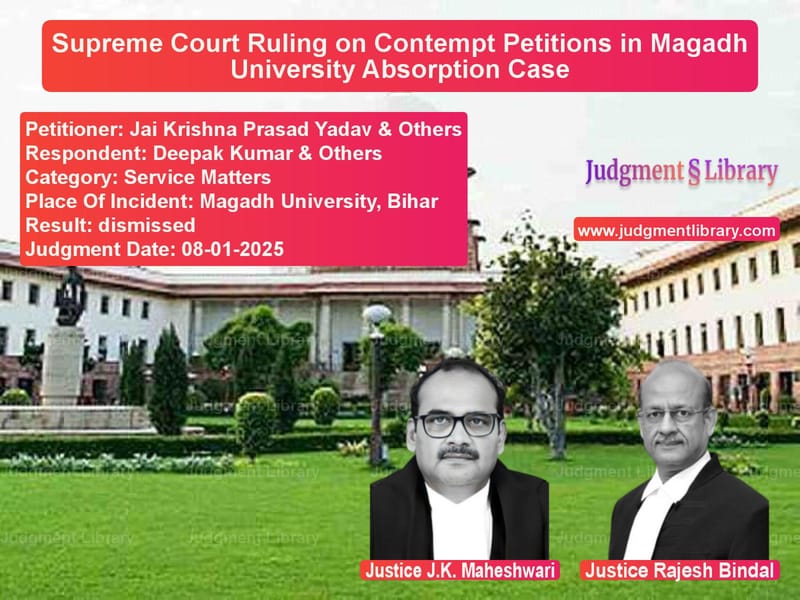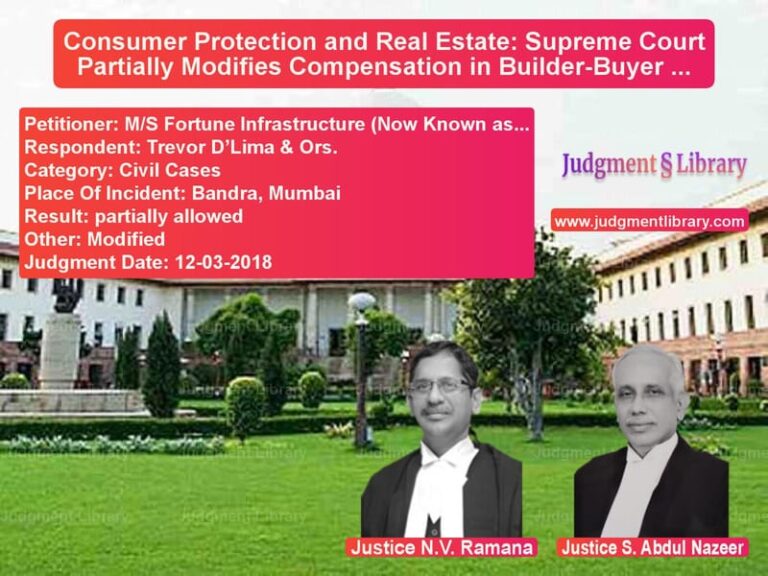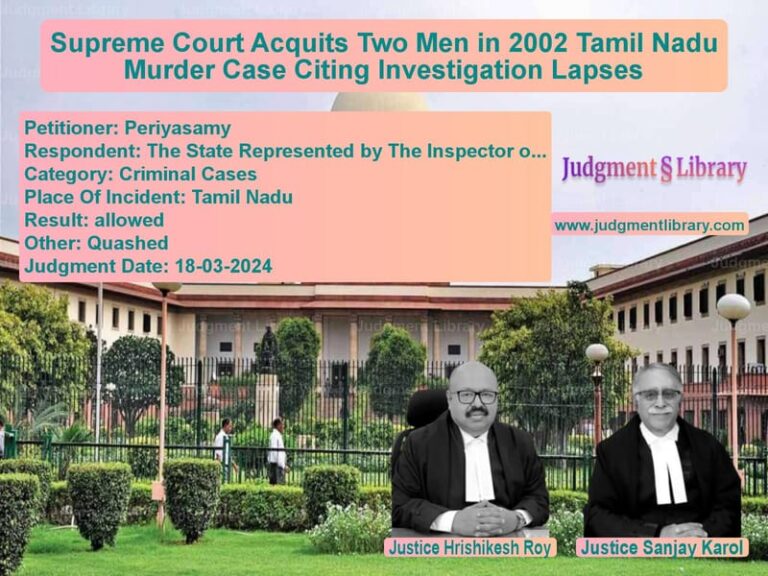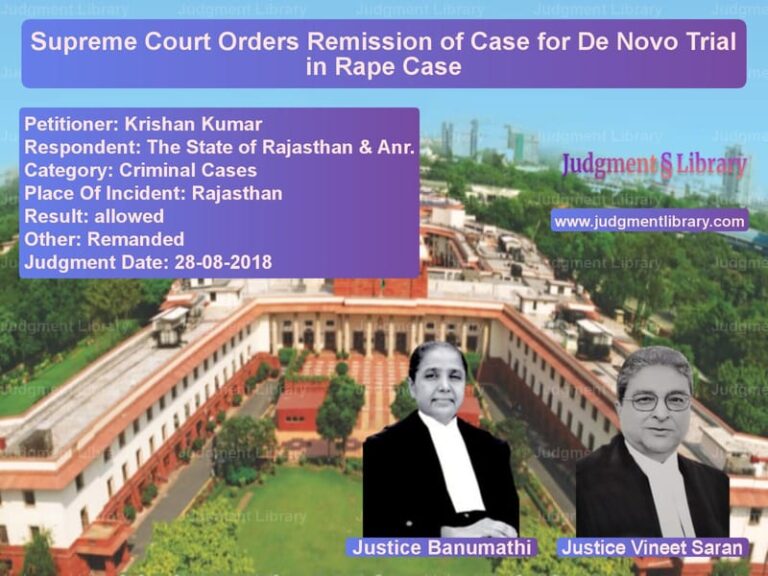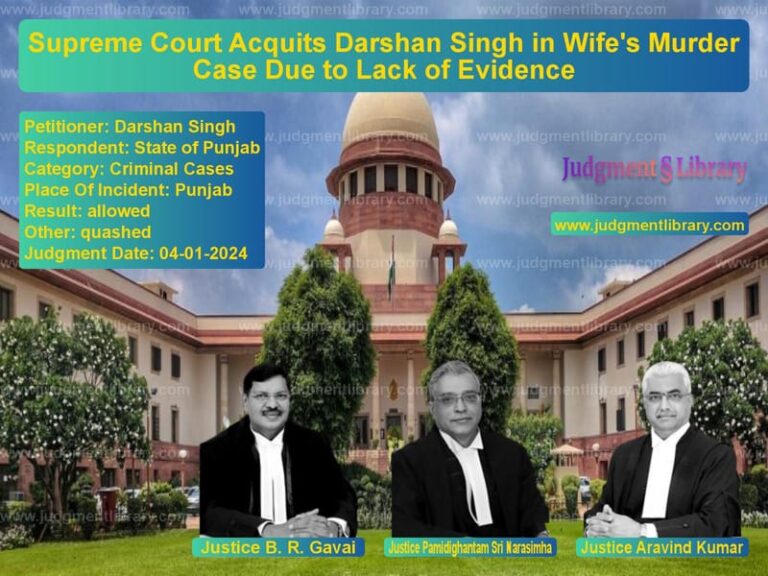Supreme Court Ruling on Contempt Petitions in Magadh University Absorption Case
The Supreme Court recently delivered a crucial judgment in a series of contempt petitions related to the Magadh University absorption case. The ruling has significant implications for university employees seeking salary arrears and pension benefits. The case revolved around the non-compliance of a prior order issued in Krishna Nand Yadav & Others v. Magadh University & Others, where the Court had approved the recommendations of the J. Sinha Commission and directed the State to ensure compliance.
The petitioners in these contempt proceedings alleged that despite the Supreme Court’s earlier order, the authorities had failed to release their pending salaries and pension benefits. The respondents, however, argued that the petitioners were not entitled to such payments as they had not worked during the absorption period. This led to a complex legal debate on compliance with judicial directives and the rights of absorbed employees.
Background of the Case
The dispute originated from the absorption of university employees in Magadh University. Following legal battles, the Supreme Court had previously ruled in favor of these employees, directing the authorities to grant them appropriate benefits, subject to certain conditions. However, several employees later filed contempt petitions, claiming that the authorities had failed to comply with the Court’s order.
Key Legal Issues
- Whether the authorities were in contempt of court for failing to implement the judgment in Krishna Nand Yadav & Others v. Magadh University & Others.
- Whether the petitioners were entitled to arrears of salary and pension benefits.
- Whether the matter required further factual adjudication beyond the scope of contempt proceedings.
Arguments of the Parties
Petitioners’ Arguments
The petitioners, represented by their legal counsel, argued:
- The authorities had failed to comply with the Supreme Court’s directive to release salary arrears and pension benefits.
- The J. Sinha Commission had already established their entitlement to these benefits, and the respondents were unlawfully withholding their dues.
- The failure to implement the Court’s ruling amounted to contempt, warranting strict judicial action.
Respondents’ Arguments
The respondents, including representatives from Magadh University and State authorities, countered:
- Not all petitioners were party to the original case, and their claims needed independent verification.
- The petitioners had not actually worked during the absorption period, and as such, salary arrears were not payable.
- The matter required further factual inquiry, which could not be conducted within contempt proceedings.
Key Observations and Judgment
Supreme Court’s Findings
The Supreme Court, after examining the arguments, made the following observations:
“It is now the grievance of the petitioners that even after recommendation of J. Sinha Commission and orders passed in their favor, as accepted by this Court, the benefit of arrears of salary and pension have not been granted by the authorities in view of the orders passed in subsequent proceedings.”
The Court noted that the issue of actual working during the absorption period was disputed and required further factual adjudication. It held that contempt proceedings were not the appropriate forum for determining such factual disputes.
Final Judgment and Directions
The Supreme Court disposed of the contempt petitions with the following directions:
- Each petitioner must submit their claim for salary arrears and pension benefits, along with supporting documents, to the Registrar/Vice-Chancellor of the concerned university.
- A discrete inquiry must be conducted to verify the actual working status of the petitioners, affording due opportunity to all relevant parties.
- If it is determined that the petitioners were entitled to salary and arrears, payments should be made within three months of the decision.
- Pension claims must be decided separately, uninfluenced by previous orders restricting payments.
- If excess payments had been made, authorities would have the right to recover such amounts following due procedure.
- If petitioners were dissatisfied with the decision of the Registrar/Vice-Chancellor, they could seek further recourse before the High Court.
Implications of the Judgment
This judgment provides a structured mechanism for resolving salary and pension disputes in Magadh University while preventing misuse of contempt proceedings for adjudicating factual disputes. The ruling reaffirms that contempt jurisdiction should not be used as a substitute for fact-finding inquiries, which must be conducted by competent administrative authorities.
Conclusion
The Supreme Court’s ruling in this case strikes a balance between enforcing judicial orders and ensuring procedural fairness in claims for monetary benefits. By directing a structured inquiry into salary and pension claims, the judgment provides a clear roadmap for affected employees while maintaining the integrity of the contempt jurisdiction.
Petitioner Name: Jai Krishna Prasad Yadav & Others.Respondent Name: Deepak Kumar & Others.Judgment By: Justice J.K. Maheshwari, Justice Rajesh Bindal.Place Of Incident: Magadh University, Bihar.Judgment Date: 08-01-2025.
Don’t miss out on the full details! Download the complete judgment in PDF format below and gain valuable insights instantly!
Download Judgment: jai-krishna-prasad-y-vs-deepak-kumar-&-other-supreme-court-of-india-judgment-dated-08-01-2025.pdf
Directly Download Judgment: Directly download this Judgment
See all petitions in Employment Disputes
See all petitions in Pension and Gratuity
See all petitions in Public Sector Employees
See all petitions in Judgment by J.K. Maheshwari
See all petitions in Judgment by Rajesh Bindal
See all petitions in dismissed
See all petitions in supreme court of India judgments January 2025
See all petitions in 2025 judgments
See all posts in Service Matters Category
See all allowed petitions in Service Matters Category
See all Dismissed petitions in Service Matters Category
See all partially allowed petitions in Service Matters Category

